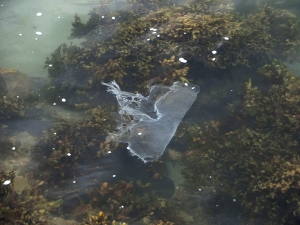Banning plastic bags – the tip of the iceberg
 If you stash a handful of plastic bags in the cupboard after your weekly supermarket shop, then this article is for you.
If you stash a handful of plastic bags in the cupboard after your weekly supermarket shop, then this article is for you.
The NSW Greens have announced an election pledge to ban the single use plastic shopping bag. Many other States and Territories have already gone down that path via bans or 10 cent fees.
Whenever we debate shopping bags, images of distressed turtles and dead seabirds come to mind. The political case for banning plastic bags is easy. The priority argument is much harder.
Australians use more than 6 billion plastic bags a year and most of these end up in landfill. They comprise an estimated 2% of litter. Once in the environment they have an ecological impact, due to plastic’s persistence. However, plastic bags are neither the biggest litter problem nor by any stretch, are they the biggest waste problem.
We must get our priorities right.
From a recycling or waste management perspective, plastic bags are almost insignificant. For all the billions of individual bags we landfill, they constitute just 20,000 tonnes of waste or 0.09% of Australia’s landfill waste stream. This is less than the waste generated by a typical small rural town in one year.
Plastic bags are inert in landfill. They cause little or no harm. Some might argue landfilling them is a waste of resources. True, but 20,000 tonnes is tiny in the scheme of things. I argue that there are more important waste priorities. That is the point of this article.
The highest priority by far is organic waste going to landfill. Organic waste includes food, garden waste, timber, pallets, paper and cardboard etc.
Organic waste represents over 50% of all waste we landfill, or 10 million tonnes. Put another way, organic waste is 500 times more significant (by weight) than plastic bags. It is the single largest stream going to landfill. Organic waste in landfill is not inert. It breaks down (anaerobically) to generate methane which unless captured leaks into the environment. Methane is a potent greenhouse gas (25 times the global warming potential of carbon dioxide) and accounts for 11 million tonnes of Australian greenhouse gas emissions.
Thankfully well run landfills can capture a significant amount of methane, but across all landfills in Australia, not enough. As such, methane’s contribution to climate change poses far bigger risks to marine ecosystems, than plastic bags.
I am pleased to say many State and local governments are now accelerating organics recovery with infrastructure, policies, price signals and funding. This is being backed up by industry and households. More power to them.
My fear is that whilst arguing about bans or pricing plastic bags, we will take our eye off the main game. Others say let’s move on the ‘simple’ things first.
I say, if we are going to ban or price plastic bags, then let’s get it done quickly. Plastic bags are one visible, but very small piece, of an important, and very large, iceberg.



